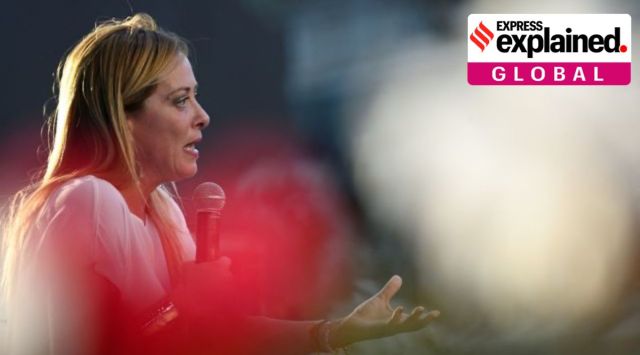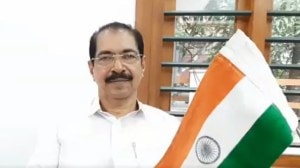Meet Giorgia Meloni, who may lead Italy’s first far-right govt since World War II
Who is Giorgia Meloni, why has her popularity soared in the past years, and why is she dogged by allegations of Fascism?
 Giorgia Meloni, leader of the far-right Brothers of Italy party, speaks during a rally in Duomo square ahead of the Sept. 25 snap election, in Milan, Italy, September 11, 2022. (Reuters Photo: Flavio Lo Scalzo)
Giorgia Meloni, leader of the far-right Brothers of Italy party, speaks during a rally in Duomo square ahead of the Sept. 25 snap election, in Milan, Italy, September 11, 2022. (Reuters Photo: Flavio Lo Scalzo)Italy is on the brink of what could prove to be a historic election – going by pre-poll trends, once votes are cast on September 25, the country could elect its first far right government since World War II, and its first woman prime minister. Giorgia Meloni’s Fratelli d’Italia (Brothers of Italy) seems set to capture around 25 per cent of the vote share, getting Meloni the top job, almost 100 years after another far right leader, Benito Mussolini, stormed Rome.
Who is Meloni, why has her popularity soared in the past years, and why does this ring alarm bells for many in Italy and Europe?
Another ‘nationalist’ rises
Giorgia Meloni’s career and appeal share commonalities with right-wing leaders in many other countries – the promise of an untried leader amid disenchantment with the powerful, working class origins, ‘honest’ image, thundering rhetoric, championing of the traditional family setup, hardline on immigrants, and denouncing ‘wokeness’. While she insists she is not fascist, her party’s roots and statements by her and her colleagues have left many concerned.
Her coming to power amid the Russia-Ukraine war, at a time much of Europe is groaning under increased costs of living and Italy’s finances are in disarray, could have implications for the entire continent.
The 45-year-old Meloni grew up in Garbatella, a working class neighbourhood of Rome, after her father moved away from the family. In her teens, she joined the Italian Social Movement (MSI), which was created by Mussolini’s supporters in 1946. This group was like a “new family” to her, Meloni has written in her 2021 autobiography, ‘I am Giorgia‘. She continued to work with right-wing organisations as she climbed up the political ladder.
In 2006, Meloni was elected to the Italian Parliament’s Chamber of Deputies. In 2008, she became Italy’s youngest minister, in Silvio Berlusconi’s government. In 2012, she formed her own political party, Brothers of Italy, borrowing the name from the Italian national anthem, and the symbol — a flame in colours of the Italian tricolour – from MSI, believed to stand for the flame burning atop Mussolini’s tomb.
The new party won a little over four per cent of the vote share in the 2018 elections, but this time, facing a dishevelled centre-left, looks set for pole position. If Brothers of Italy comes to power, it will do so in coalition with Berlusconi’s Forza Italia and Matteo Salvini’s League. What gives Meloni the edge over her more seasoned allies is that hers was the only party last year to not join a broad coalition under technocrat Mario Draghi, which collapsed under its contradictions in July, necessitating the September 25 election. Brothers of Italy, thus, is the only party that can attack the previous government as the ‘Opposition’.
Meloni is also the current chairperson of European Conservatives and Reformists Party.
Meloni’s programme, policies
Broadly, Meloni favours a business-friendly dispensation that will give tax cuts to all and not just the financially weak, she wants to boost Italy’s flagging birth rate, impose a naval blockade to stop immigrants, and limit the European Union’s role in Italy’s affairs, though without doing “crazy things”.
In the Russia-Ukraine war, she has backed Ukraine, like other major European powers.
Women’s rights, including abortion and proportional representation, LGBTQI rights, and the rights of minorities are likely to suffer under her. According to Reuters, speaking at a rally in June, Meloni said, “Yes to natural families, no to the LGBT lobby, yes to sexual identity, no to gender ideology, yes to the culture of life, no to the abyss of death.”
The news agency further quoted her as saying, “No to the violence of Islam, yes to safer borders, no to mass immigration, yes to work for our people, no to major international finance.”
She says the entry of migrants into Italy, which has a low birth rate and an ageing population, is a greater conspiracy for “ethnic substitution”, and vows that under her, the country will be taken more seriously on the international stage.
Many have attributed Meloni’s leap from fringe to centrestage to Italy’s failure in fully examining its fascist past, unlike Germany. Meloni, however, seems more conscious and calculative about her political past, toning down her comments to international media while cranking up the heat in poll rallies.
- 01
- 02
- 03
- 04
- 05





































